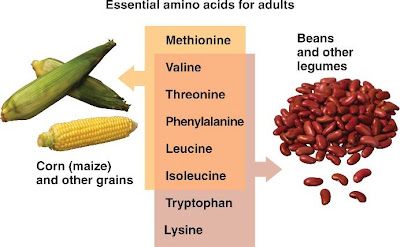Essential nutrients are called all the nutrients needed for the normal function of our bodies that either can not be synthesized, or are made in small quantities in our bodies. We need these nutrients in the right amounts at the right time, if we want to live a healthy life.
Essential nutrients are divided in four big categories:
- Vitamins,
- Dietary minerals,
- Essential fatty acids,
- Essential Amino acids.
Before entering in details on our needs for each class of nutrients, let's start with a brief explanation.
Vitamins
Vitamins can not be synthesized in our bodies, but they play a very important role in our metabolism. Without them we can not function, because of their role as enzymes and co-enzymes in chemical reactions, and in the removal of free radicals from the cells.
Without vitamins, chemical reactions in our body, can not happen. In other words, if the cell needs 'X' molecule, let's say, it gets this molecule, by combining A+B= X, with the help of enzymes. These enzymes work only if the specified vitamin exists. So, if low quantities of the needed vitamin are found in our body, then our organism can not satisfy its need with X molecules. The absence of these X molecules can even cause a disease or an unhealthy condition in our bodies.
The vitamins are never needed in big quantities, they are needed in small amounts at all times. Especially when we get sick, we need more of them, since our metabolism increases its rhythm, when fighting a disease or an infection.
Dietary minerals
Dietary minerals, or mineral nutrients are the chemical elements required by all living species, other than the four elements carbon, hydrogen, nitrogen, and oxygen present in common organic molecules.
Minerals, in order of abundance in the human body include the seven major minerals calcium, phosphorus, potassium, sulfur, sodium, chlorine, and magnesium. Important "trace" or minor minerals, necessary for our life, include iron, cobalt, copper, zinc, molybdenum, iodine, and selenium. For more information on this topic, you can read my other post entitled 'Elements of nutrition, indispensable for you', if you haven't already.
Essential fatty acids
Essential fatty acids, or EFAs, are fatty acids that humans and other animals must eat, because the body requires them for good health but can not synthesize them. The term "essential fatty acid" refers to fatty acids required for biological processes but does not include the fats that only act as fuel. So, do not use this as an excuse to eat at MC Donald's... ;)
Only two fatty acids are known to be essential for humans: alpha-linolenic acid (an omega-3 fatty acid) and linoleic acid (an omega-6 fatty acid)
Essential Amino acids
An essential amino acid or indispensable amino acid is an amino acid that cannot be synthesized from scratch by our organism and therefore must be supplied in the diet.
The amino acids regarded as essential for humans are phenylalanine, valine, threonine, tryptophan, isoleucine, methionine, leucine, lysine, and histidine. Additionally, cysteine (or sulphur-containing amino acids), tyrosine (or aromatic amino acids), and arginine are required by infants and growing children.
Stay healthy!



Dietary_minerals.PNG)


